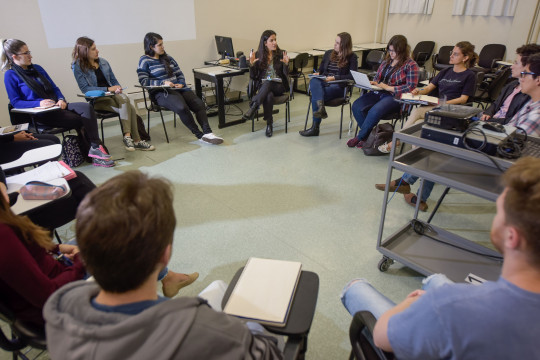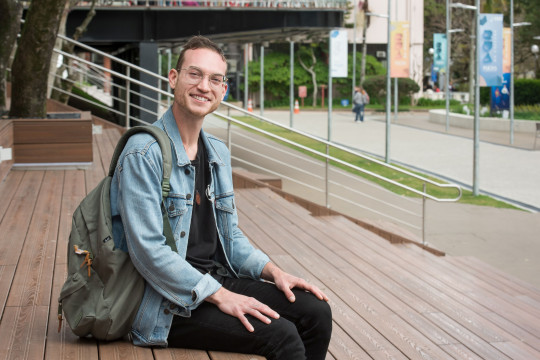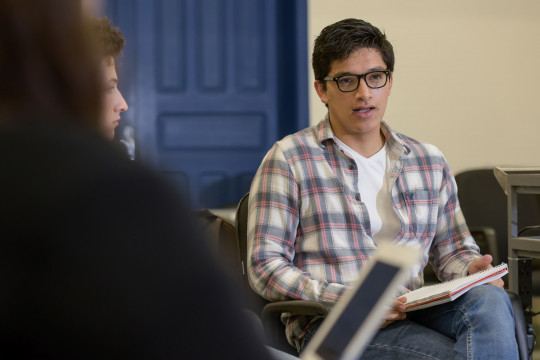Are you ready for a globalized job Market?
English, as one of the most spoken languages on the planet, is a lingua franca in businesses, tourism, academia and international relations. Having the skills to communicate in that universal language is no longer a line in a person’s résumé, but a basic requirement in the job market. More than being a source of information and a provider of academic and humanistic training, the university must prepare its students for a world without borders, an international environment where activities beyond academic mobility will abound as they will foster the exchange of experiences and cultures.
PUCRS offers its students the challenge to learn the classroom topics in English, just like they would if they were in a university overseas. Courses delivered entirely in English are offered both at the undergraduate and graduate levels. They are useful for students to work on specific terminologies an develop competences for a globalized world.
This will prepare students for graduate school overseas, networking activities with professionals from all over the world, job opportunities in global companies and even for getting a job abroad. Courses in English have been implemented under the university’s strategic plan with an eye to internationalization, in that many of these courses are interdisciplinary. “They have been designed for both incoming and outgoing academic mobility students for a variety of reasons: these students might take part in international competitions, go to graduate school abroad, brush up their language or even live in internationalized environments”, says Gabriela Wallau, of the Office of Academic Development, which is accountable to the Office of the Vice President of Undergraduate Studies and Continued Education (Prograd).
MEANS OF COMMUNICATION

Classes taught in a language other than Portuguese as they would be taught in an university overseas
PUCRS is keen on implementing English as a Medium of Instruction (EMI), a growing trend at world-level universities. At the undergraduate level, the courses in English use the language as a means of communication to delve into the topics. “It’s not an English class, it’s a class taught in English”, adds Gabriela, who teaches the course Alternative Dispute: Resolution Mediation, Arbitration and Conciliation and Business Law II: Corporations.
Many courses are guided by interdisciplinary work. Cristina Perna is responsible for the course Theories in Language Acquisition and, in her view, it brings together insights from Philosophy, Psychology, History, Communications and Medicine. “Students can learn a lot from one another and relate to topics that were addressed in other courses. A full immersion into the language, which may serve to encourage them to do an academic mobility program in the future. It is good for their biological, physiological and neurological functions as learning an additional language increases brain plasticity”, says she.
At the age of 53, business administrator José Gazola is now back in school. He was influenced by his daughter, who is a Medical School student. He choose Modern Languages, an old dream, and takes classes with Perna. He claims that doing courses in English is an excellent opportunity. “In such a competitive and globalized world, English is essential for all professions, in any area”, reflects he. There is something else to it: they mostly mirror the undergraduate curricula. By choosing to take the course in English, students will be exempt from taking it in Portuguese. In the second semester of 2018, 15 courses were offered and the number of students reached to 200.
PUCRS, a destination for international students

Canadian student Zachary Lohnes, is enrolled in the courses that are delivered entirely in English
Undergraduate courses in English can be an alternative for international students who wish to go on an academic mobility program in Brazil but whose competence in Portuguese is low. In the second semester of 2018, these courses are being attended by 22 mobility students. Conversely, they may opt for the course Portuguese for International Students, which is offered at no charge in the two weeks that precede the beginning of the scholastic semester.
Zachary Lohnes, a 5th semester Philosophy and Gender Studies major of Dalhousie University (Canada), chose Brazil because of his interest in the South American culture. He found in PUCRS the chance to have classes in his native language. “This is such a positive experience for me in many ways. The course on Digital Entrepreneurship has made me look at the world from a perspective I had not yet envisioned. It helped me expand my sense of business structure and digital world. It is great to have professors who speak the same language I speak”, says the 23 year-old who arrived in Porto Alegre in June and will be staying here until December.
Professor Rafael Chanin delivers the course entirely in English and brings theory and practice together. In his classes, he uses different skills, such as reading, speaking, and listening comprehension to facilitate learning. “15% to 20% of the class is devoted to contextualizing the meaning of entrepreneurship and its basic concepts. The remaining 85% – 80% is devoted to group work and brainstorming activities. These activities include defining the business they want to work and developing its potential with a specific audience”, says he. Over the course of his career, Chanin has welcomed students from different parts of the world, including Barthes Island, in the Pacific. These students designed a website for people interested in visiting the territory, with an eye to tourism. “If they want to sell things, they will use everything they know and the tools they learn in class”, adds he.
The language of Science
The Dean of Graduate Studies, Christian Haag Kristensen, claims that English is the language of science and the courses in that language are helpful for students’ speaking, writing, reading and listening skills. On that line, PUCRS is promoting internationalization at home and providing its students with insights into global issues as well as a deep immersion into the terminology of their area. “We are going to invest heavily in the internationalization of the curriculum and increase the number of international students in our programs”, says he.
Students play an active role in class and, as they acclimate to a friendly atmosphere, they feel comfortable in using English. “These courses make a very meaningful contribution and develop a relationship of encouragement and camaraderie among students. Although our graduate students are expected to read scientific materials in English and watch movies and series in English, not many of them will have a chance to practice speaking”, says Mônica Vianna.
Opportunities abroad

Mario Villegas does the course on Scientific Writing and Communication taught by Mônica Vianna
PUCRS now offers 22 graduatelevel courses in English, all of which are elective, and offered regularly. From the second semester of 2016 to the second semester of 2018, 235 students were enrolled in them, 12 of which were internationals. Mario Alejandro Duque Villegas, a Biological Sciences major from Caldas University (Colombia), is working on his Master’s in Cellular and Molecular Biology and does the course on Scientific Writing and Communication.
The fact that the University offers courses is English was one of the reasons he chose it. “In professional terms, having a Master’s from Brazil and in a language other than my mother tongue is great in and out of itself, but getting to know a different culture and how people do science there is important for my career. Personally, it has been a challenge. In the beginning of the year, I couldn’t string a sentence together in Portuguese but people would be very understanding”, says he.
MORE CONFIDENCE
For the professor who teaches the course, Mônica Vianna, language competence is essential Opportunities abroad for the students’ professional development, especially in science. “This experience earns them more confidence to explore development opportunities abroad, such as doctoral internships and internships in laboratories. Science is ‘made’ in English and, as one of the scholars I use in my courses says: a scientist is a communicator.”
Although this course is offered to students in the Graduate program in Cellular and Molecular Biology, students enrolled in any other programs are eligible for it. According to Mônica, students in the graduate programs in Psychology, Medicine and even Materials Engineering and Technology and Electrical Engineering, have taken it. “These kids get fully integrated and play an active role in our discussions. By discussing specific aspects of their areas of expertise and original programs, not only can we advance interdisciplinarity but also the development of a broader perspective. This is how they get to know the university outside of their programs”, adds she.
LEXIS - LANGUAGE CENTER
In addition to the courses in English, PUCRS’ Language Center – Lexis offers a number of language programs. Today, German, Spanish, French, Greek, English, Italian, Japanese, Russian and Libras – Brazilian Sign Language are offered. Find out Learn more at www.pucrs.br/humanidades/lexis.




